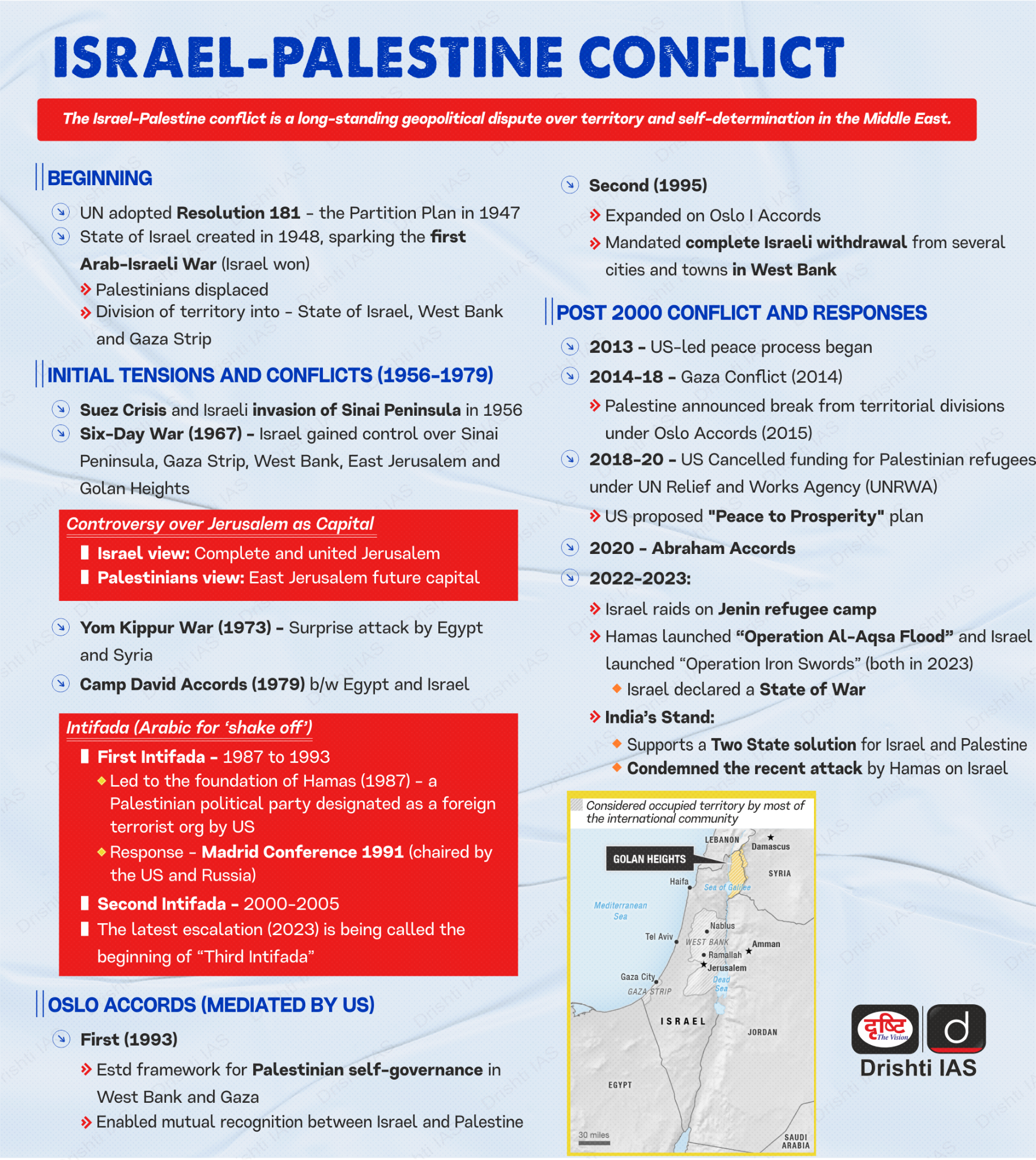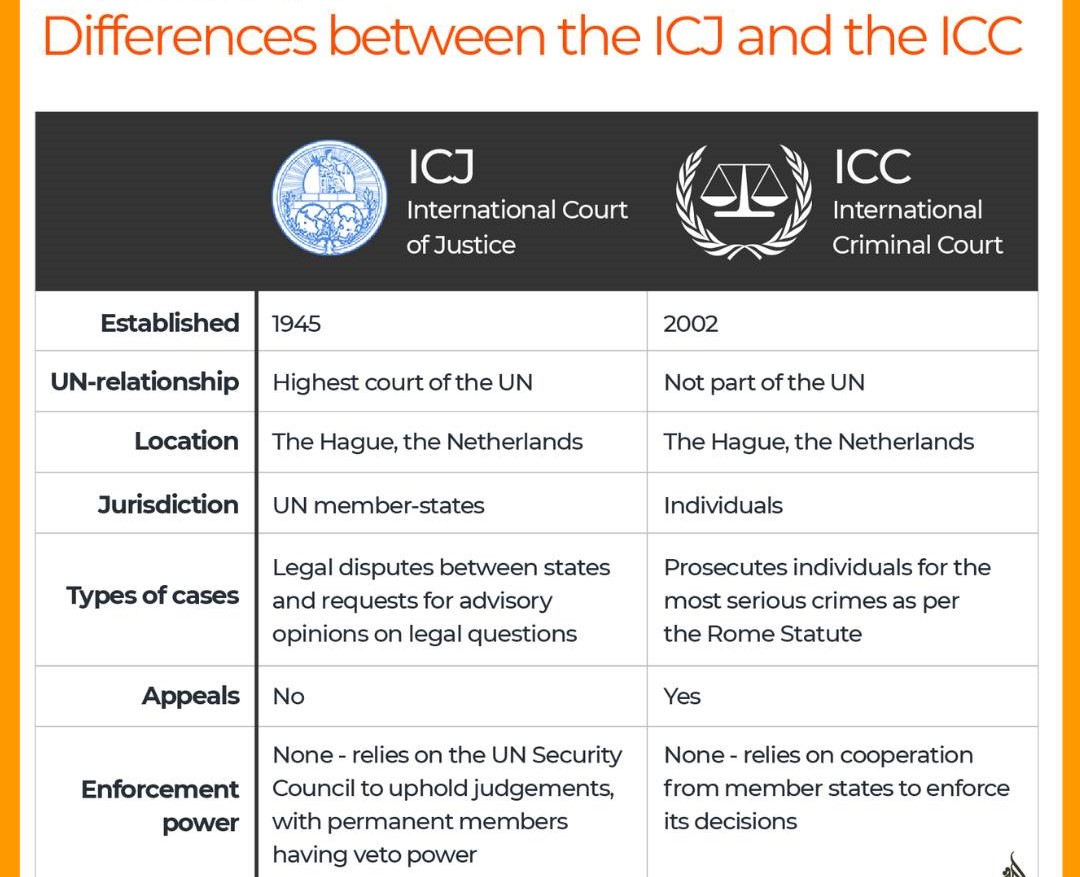International Relations
Arrest Warrants Against Israel and Hamas Leaders
- 24 May 2024
- 7 min read
For Prelims: International Criminal Court (ICC), Israel and Hamas, ‘The Rome Statute’, United Nations Security Council (UNSC), International Court of Justice, Geneva Conventions (1949)
For Mains: About International Criminal Court, War Crimes and Related Conventions
Why in News?
Recently, the International Criminal Court (ICC) prosecutor has requested arrest warrants against leaders of Hamas and the Prime Minister and Defence Minister of Israel for the war crimes in Palestine.
Note:
- Israel is not a member of the ICC, so even if the arrest warrants are issued, the concerned leaders do not face any immediate risk of prosecution. However, if the threat of arrest further deepens Israel’s isolation will make it difficult for the Israeli leaders to travel abroad.
- The ICC accepted “The State of Palestine” as a member in 2015.
What is the International Criminal Court?
- About ICC:
- It is the world’s first permanent international criminal court governed by an international treaty called ‘The Rome Statute’.
- In 1998, the Rome Statute was adopted by 120 States in the direction of creating a more just world.
- In 2002, Rome Statute took effect upon ratification by 60 states, officially establishing the ICC. Since it has no retroactive jurisdiction, the ICC deals with crimes committed on or after this date.
- India is not a party to the Rome Statute along with the US and China.
- 124 countries are States Parties to the Rome Statute of the International Criminal Court with Malaysia being the last one.
- It is the world’s first permanent international criminal court governed by an international treaty called ‘The Rome Statute’.
- Jurisdiction and Working:
- It investigates and, wherever warranted, tries individuals charged with the gravest crimes of concern to the international community: genocide, war crimes, crimes against humanity and crimes of aggression. Also:
- The crimes are committed by a State Party national, in the territory of a State party, or in a State that has accepted the jurisdiction of the court.
- The crimes are referred to the International Criminal Court Prosecutor by the United Nations Security Council (UNSC) pursuant to a resolution adopted under Chapter VII of the UN Charter.
- The ICC is intended to complement, not to replace, national criminal systems.
- It prosecutes cases only when States are unwilling or unable to do so genuinely.
- ICC is not a UN organisation but it has a cooperation agreement with the UN.
- When a situation is not within the Court’s jurisdiction, the UNSC can refer the situation to the International Criminal Court granting it jurisdiction.
- Several countries like Israel, the US, Russia and China. don’t accept the court’s jurisdiction over war crimes, genocide and other crimes.
- It investigates and, wherever warranted, tries individuals charged with the gravest crimes of concern to the international community: genocide, war crimes, crimes against humanity and crimes of aggression. Also:
- Difference between ICC and ICJ:
What is a War Crime?
- About:
- War crimes are defined as serious violations of humanitarian laws during a conflict; the taking of hostages, willful killings, torture or inhuman treatment of prisoners of war, and forcing children to fight are some of the more obvious examples.
- It is based on the idea that individuals can be held liable for the actions of a state or its military.
- War crimes are defined as serious violations of humanitarian laws during a conflict; the taking of hostages, willful killings, torture or inhuman treatment of prisoners of war, and forcing children to fight are some of the more obvious examples.
- War Crime vs Crime Against Humanity:
- The United Nations Office on Genocide Prevention and the Responsibility to Protect (or Genocide Convention) separates war crimes from genocide and crimes against humanity.
- War crimes are defined as occurring in a domestic conflict or a war between two states.
- While genocide and crimes against humanity can happen in peacetime or during the unilateral aggression of a military towards a group of unarmed people.
- The United Nations Office on Genocide Prevention and the Responsibility to Protect (or Genocide Convention) separates war crimes from genocide and crimes against humanity.
- Geneva Conventions on War Crime:
- The Geneva Conventions (1949) and their Additional Protocols are international treaties that contain the most important rules limiting the barbarity of war.
- They protect people who do not take part in the fighting (civilians, medics, aid workers) and those who can no longer fight (wounded, sick and shipwrecked troops, prisoners of war).
- The first Geneva Convention protects wounded and sick soldiers on land during war.
- The second Geneva Convention protects wounded, sick and shipwrecked military personnel at sea during war.
- The third Geneva Convention applies to prisoners of war.
- The fourth Geneva Convention affords protection to civilians, including in occupied territory.
- India is a party to all the four Geneva Conventions.
UPSC Civil Services Examination Previous Year Questions (PYQs)
Prelims
Q 1. Which one of the following countries of South-West Asia does not open out to the Mediterranean Sea? (2015)
(a) Syria
(b) Jordan
(c) Lebanon
(d) Israel
Ans: (b)
Mains
Q1. ‘Too little cash, too much politics, leaves UNESCO fighting for life.’ Discuss the statement in the light of the US’ withdrawal and its accusation of the cultural body as being ‘anti-Israel bias’. (2019)
Q2. “India’s relations with Israel have, of late, acquired a depth and diversity, which cannot be rolled back.” Discuss. (2018)






